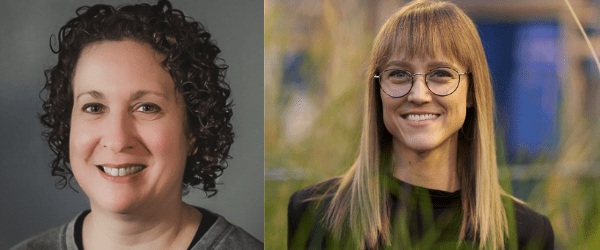Thinking Local: Danforth Center Community Members Address Food Security in St. Louis
St. Louis has emerged as a recognized global leader in agtech- with a community of innovative corporations, entrepreneurs, startups and world-class research institutions who are collaborating in bold ways to ensure global food security by rethinking the ways in which we grow, harvest, produce and distribute food. At the same time, we face a growing food security challenge right here at home, where one of every five kids in the state of Missouri are hungry and at risk of not knowing where their next meal is coming from.
On September 14, Taylor AuBuchon senior laboratory technician in the Kellogg lab, and Missy Rung-Blue, grants specialist in the Meyers lab, participated in the STL Hunger Shift Hackathon. The event brought together leaders, innovators, organizers, scientists and entrepreneurs from around the region with the goal to generate ideas for real solutions using the cumulative knowledge and talent from the diverse group of people.

Missy Rung-Blue and Taylor AuBuchon
“I was introduced to the concept of food insecurity when I was an undergraduate student at Webster University. I used to think a ‘food desert’ was an area that was 20 or 30 miles away from the nearest grocery store, in more rural communities. It was only in the past couple years that I understood that wasn’t the case; and that food insecurity affects communities all around St. Louis,” explains Taylor. “Being at the Danforth Center, I kept thinking how well placed we are to be able to help bring more food to more people in our own backyard,”
Taylor and Missy were in separate groups that both addressed the question, “How do we create more outlets for fresh, affordable food in areas experiencing food desertification?” Missy’s team was interested in the idea of distribution outlets within food desert communities. “Our team felt there were lots of opportunities to increase access to fresh food by taking advantage of the outlets that already exist in the community. That means approaching non-traditional grocery vendors to encourage them to stock more fresh food. Our team agreed that community involvement is vital to success. Different communities may have different needs and infrastructure that require different approaches to distribution,” explains Missy.
The conversation in Taylor’s group evolved pretty organically. Event organizers encouraged the teams to “spit out” ideas as they came, no matter how well thought out. They discussed current problems in food desertification, roadblocks to solutions, and the different intricacies involved in tackling such a complicated, systemic problem. They also discussed what was currently working - like urban farms, different community building efforts, the promise of the Metro Markets here in St. Louis and how they could expand, as well as community members that are working to address food insecurity, but haven’t received the same kind of exposure as larger organizations.
Taylor’s group came to the conclusion that funding is a consistent barrier. “What if we created a seed fund or an incubator that served these community organizers? Community folks already know what they need - they could make the pitches, they could decide what best suits their communities,” says Taylor.
Three project teams have been formed to advance ideas:
CSA: Establish a box pick-up program at community churches, convenience/corner stores and/or community retailers to create greater access to fresh food. The boxes will contain QR codes to recipes/banking/education materials.
APP: Develop an app that provides food insecure neighbors with real time access to food resources including CSA program pick-up + urban farms + donations + restaurant overflow, etc., and financial education. The team hopes to engage Launchcode and ESRI for technical expertise and resources.
SEED FUND: Create a Community Pitch Day in which people can pitch ideas for providing their food insecure neighbors with access to fresh food. Community residents can vote on the ideas they like best. Winning ideas will receive seed funding and entrepreneurial support to bring the ideas to life.
Missy and Taylor know that there is a long way to go, but they both left the event inspired. “I’m excited for the St. Louis region and the talented people here who are also passionate about helping to get more food to the folks who need it,” says Taylor. “This is all doable! It will just take commitment and resources.”